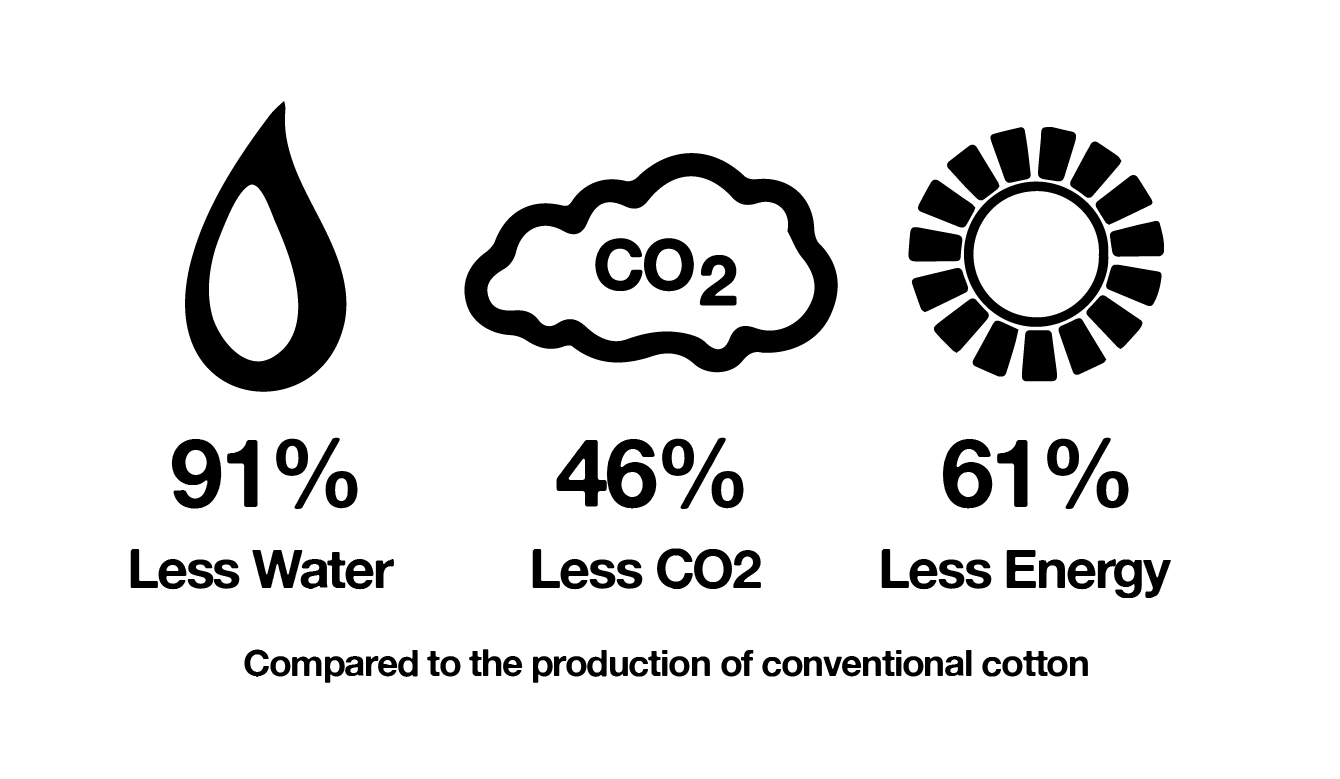
Materials & Process
Truth to Materials
The clothing industry is the second largest polluter in the world. There are many complexities and nuisances associated within the textile industry. We feel that it is a shared responsibility as a collective to improve how we create and operate continuously. Supporting brands that prioritise fair labour practices, environmental responsibility, and transparency can help drive positive change. Organic cotton production accounts for less than 1% of the global cotton industry. We are all agents of change, we can make this world a fairer and more sustainable place with our daily actions, especially with our purchases.
From day one we have only chosen to use methods to source and integrate natural & recycled fibres such as organic cotton , recycled polyester and hemp. We are committed to what we put out is congruent with our values of responsible sourcing, fair trade and ethical practices. We know that there is alternative solutions to producing clothing that is environmentally sound without compromising quality , functionality and durability. We want to encourage more consumers to be conscious about what we purchase to make a positive difference for both people and the planet.
Materials and Process
Organic Cotton
Organic cotton is a more sustainable choice when it comes to cultivating cotton. Organic cotton farming uses natural and traditional techniques where the seeds grown have not been genetically modified (non-GMO) and cultivated without the use of chemical pesticides and fertilizers. As a result, no harmful chemicals flow into the soil or into adjoining rivers, lakes or seas. Organic production systems improve soil quality, significantly less water is used. The overall positive effect on water, soil and biodiversity means the well-being and livelihood of farmers and their communities are respected and protected. All our t-shirts are certified 100% organic cotton.
No Genetically modified seeds
Grown without synthetic pesticides, herbicides, and fertilizers.
Conserves water as it requires less irrigation due to better soil moisture retention.
Eliminates exposure to toxic chemicals, reducing health risks for farmers and farm workers.
Reduce exposure to allergens and other irritants
Super soft on skin
Benefits:
Recycled Cotton
Recycling pre-consumer cotton helps divert textile and excess waste from production ending in landfills and our oceans. Making use of existing cotton reduces the continued dependence and reliance on virgin cotton. The recycling process bypasses the initial process of cultivating , harvesting, and processing new cotton. This results in lower overall energy consumption , minimal wastage and reduced carbon footprint.
Diverts textile waste from landfills giving unused fabrics another purpose
Bypasses the process of producing virgin cotton, conserving water, land, and energy resources
Minimises wastage from excess fabric and textile manufacturing
Benefits:
Recycled Polyester
By sourcing recycled polyester allows for considerable energy and waste savings in the manufacturing process compared to virgin polyester. We use recycled polyester to blend with other organic fibres to add stability and strength to the yarn. Our recycled polyester we use in our garments is made from post-consumer PET bottles. We use this in our beanies and hoodies.
Diverts plastic bottles and other waste from landfills and polluting oceans.
Decreases reliance on virgin petroleum to help decrease the use of non-renewable resources
Retains the strength and durability of virgin polyester.
Benefits:
Hemp
Hemp is a plant derived fibre that is a versatile, strong and durable crop. It does not require synthetic fertilisers to grow, utilises minimal water consumption and promotes soil nutrients during cultivation. This highly efficient crop has a rapid growth cycle and absorbs more carbon dioxide from the atmosphere than many other crops. Hemp fabric is also breathable, hypoallergenic and a great protector from UV rays for our skin. We currently use hemp in our socks and hats.
No herbicides or pesticides
Requires minimal water to grow
Natural breathability and moisture-wicking properties.
Produces long-lasting and sturdy fabrics
UV resistant
Hypoallergenic and non-irritating to skin
Benefits:
Our Boards
With 12+ years of experience on the board and 5+ years immersed in the skate industry, over the last few years, we have been rigorously testing different board designs learning with constructive feedback so that our blanks are tried and true. We have gone the extra mile to ensure each deck is carefully designed and made mindfully with quality craftsmanship. Our boards are cold pressed with 7ply Canadian hard rock maple construction, consisting of a traditional popsicle shape with a medium concave and neutral nose and tail kick. We emphasise keeping our boards timeless and practical to suit terrain for all disciplines from street, transition and vert.
Making skate decks from maple plywood involves several strategies to reduce environmental impact. We only order our wood in minimal quantities and carefully design and produce each board to maintain the strength characteristics of good pop and stable flex that maple exhibits. We use CNC precision cutting techniques during production to optimise precise cutting patterns and minimise any excess waste from offcuts. Our maple plywood is sourced from a quality North American and Canadian log supplier. It is certified by the Forest Stewardship Council (FSC) to ensure that the wood is harvested in an environmentally and socially responsible manner aligning perfectly with our brand ethos. Our shrink-wrap packaging to prevent pre-mature damage is also recyclable.
We will soon implement a take-back board program where skaters can return their old decks for repurposing or up-cycling.









